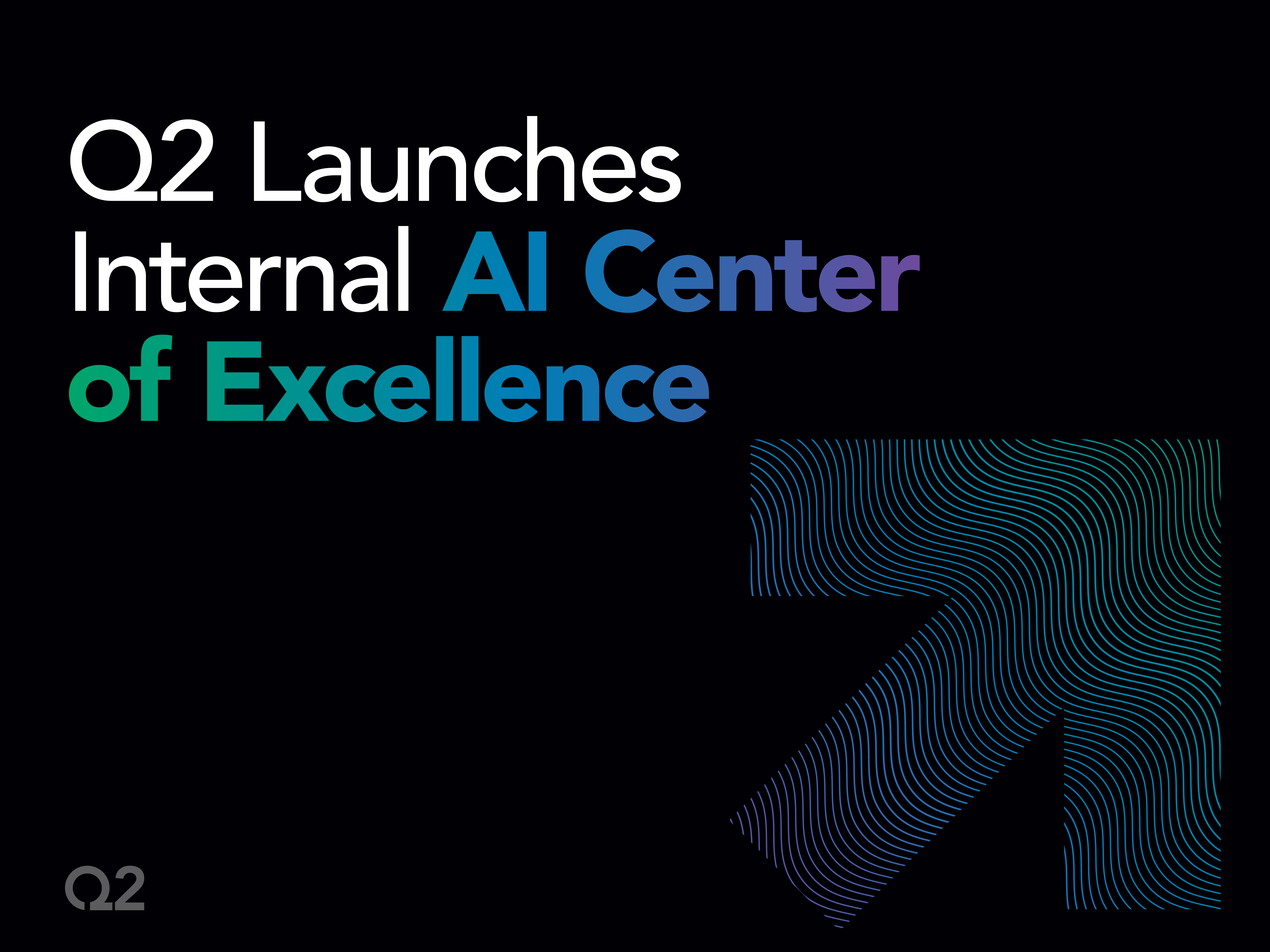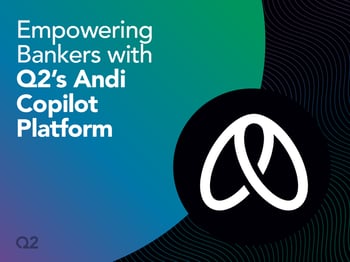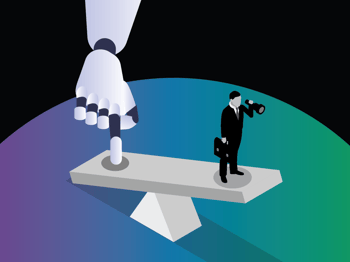Q2 Launches Internal AI Center of Excellence
By Corey Gross
There’s been a lot of buzz lately about how new AI technologies are going to revolutionize the banking industry, as if AI itself is a new tool.
Q2 is no stranger to artificial intelligence. We’ve been using it for years in a range of products from our sales and negotiation solution, Q2 PrecisionLender, to our newest offering, Q2 Security Insights. We believe GenAI has the potential to be one of the most substantial technology shifts in our lifetime, but for it to create value in our highly specialized, regulated industry, GenAI and new language models will need to be combined with a deep understanding of how banking works in general—and then be able to learn and interpret bank-, customer, and deal-specific information. In other words, Generative AI and the new language models powering it are only as good as the knowledge models they learn from.
We also realize that it can be difficult for financial institutions to cut through all the hype promoting AI tools as the great savior of banking. With that in mind, in May we launched the AI Center of Excellence, which brings together data scientists, machine learning engineers and AI specialists from across Q2.
The Center will be a resource to help financial institutions better understand how AI technology can assist them, what specific tech tools can deliver in terms of value, how to leverage that value and how to do so responsibly.
In that vein, it may be useful to define the most frequently used terms. Language Models have existed for decades. They are defined as a model for natural language that can generate probabilities of words or a series of words. We encounter them every day with common technology features like auto-complete for text and email.
Recently, Large Language Models (LLMs) have superseded other forms of language models. They are able to process vast amounts of text and use self-supervised learning to understand more and communicate more effectively.
Generative Pre-trained Transformers, or GPT, is a specific new form of LLM that processes text data to generate text output that resembles human language. In essence, it is a family of new AI language models that represent a major advancement in AI’s ability to understand and communicate in common human language.
Generative AI (GenAI) is a specific form of AI that can generate text, images, or other media using generative models. These AI tools have existed separately from LLMs and GPTs, but with new language models, they are now able to process natural language prompts, which is why they have exploded in terms of adoption and potential. Chat GPT utilizes a GPT LLM to interpret prompts in normal human language, then uses GenAI to generate responses and render them back to the user in normal language.
From an internal perspective, the Center will develop best practices for how our organization can leverage emerging AI technology to improve how we work and shape our product strategy in this rapidly changing landscape. The AI Center of Excellence coordinates Q2’s interests and efforts related to the application of AI to the business. This includes the development of products and services that we provide to our customers, ways to use AI to benefit internal operations and how to do both in an ethical manner.
Inform, Accelerate and Innovate
The Center of Excellence is divided into three pillars, each with a unique set of responsibilities.
Inform
The first function of the Inform pillar was to set up a governance structure to define the acceptable, responsible and ethical uses of AI within Q2. We’ve published a standard that outlines this type of usage at Q2 and have created an AI Ethics Council, made up of leaders from across the company, including Security, Compliance, Legal, Engineering and Human Resources. These are all folks who will be touching AI in one form or another or will adjudicate its use. We’ll discuss this in further detail below.
This pillar is also responsible for teaching the organization about the use of AI. We’re continually exploring how AI is used in Q2 products, why these tools were selected in lieu of other techniques, their benefits and limitations to customers and users and how they position Q2 in the market.
Additionally, we’re educating teams about how to responsibly leverage AI tools — such as ChatGPT, Midjourney, GitHub Copilot and others—in their own work to be more efficient, productive and creative. Part of this education is providing blueprints and how-to guides for our development organization on issues Q2 developers have already faced and solved. Rather than trying to reinvent the wheel, developers will be able to refer to our internal knowledge base.
Accelerate
We leverage our subject matter experts to help co-ideate and incubate ideas that folks want to implement but may lack the time or resources to execute. These experts pressure-test and develop viable concepts and deliver recommendations for next steps back to the respective product owner. And that’s not necessarily someone from the product and engineering organization; it’s anyone who owns the problem and brings it to the AI Center of Excellence.
For example, if a sales leader has encountered a scale challenge they believe AI can play a role in overcoming, they can propose a specific project for us to explore. Our team will then consult, prototype and validate whether an AI-powered solution is valuable.
Innovate
The last pillar is focused on informing company strategy for scale in the area of AI and has two components: operational and customer-facing.
Operational deals with internal solutions that have org-wide implications such as those provided by strategic partners, such as Amazon or Microsoft, or tools that Q2 might want to build and own. We don’t want to create one-off solutions that may be redundant with other one-off solutions, and so a key driver is to evaluate the operational implications of our partnerships and what tools need to be applied widely versus those that are team specific.
The second component focuses on how AI is integrated into current and future products, and ensuring that those tools abide by our standards of acceptable use.
Ethics at the Core
From the very beginning, it was incumbent on us to ensure that Q2 differentiate itself not just in the application of AI to our products and services, but to make clear that we're forging a responsible and transparent path in our use of AI. Our approach is one that doesn’t look at an ethical question solely from an engineering perspective, but from the larger organization and marketplace perspective as well.
Of course, this is an evolving space and when unexpected issues arise, the AI Ethics Council will adjudicate and amend our policies. The Council will make recommendations to the Management Risk Committee, which is made up of top executives from various departments, who will have the final word.
Our process is designed to ensure that we’re using AI tools in the most responsible and ethical manner and in ways that best serve our company and our customers.
Iron Man Suits, Not Terminators
Q2 has long been ahead of the curve in developing AI-powered solutions (such as our AI assistant, Andi, launched in 2017) and we’re thrilled with how the AI Center of Excellence enables us to build and expand on this important work. We have several exciting new products in development and look forward to sharing them with our customers in the coming months and years.
We believe AI will play a key role in the future of work, so Q2’s AI Center of Excellence has been established to assist our staff across the organization in harnessing its power. Like Ironman suits, we believe AI's purpose is to support knowledge-based human innovation and expertise, not replace it.
Corey Gross is a managing director & VP of Q2. Prior to joining Q2, he was the co-founder and CEO of Sensibill, whose machine learning platform enables financial institutions and fintechs to capture and categorize granular spending details to better understand the nature of consumer and business transactions. Sensibill was acquired by Q2 in October 2022.


.jpeg?width=100&height=100&name=1606330184356%20(1).jpeg)


